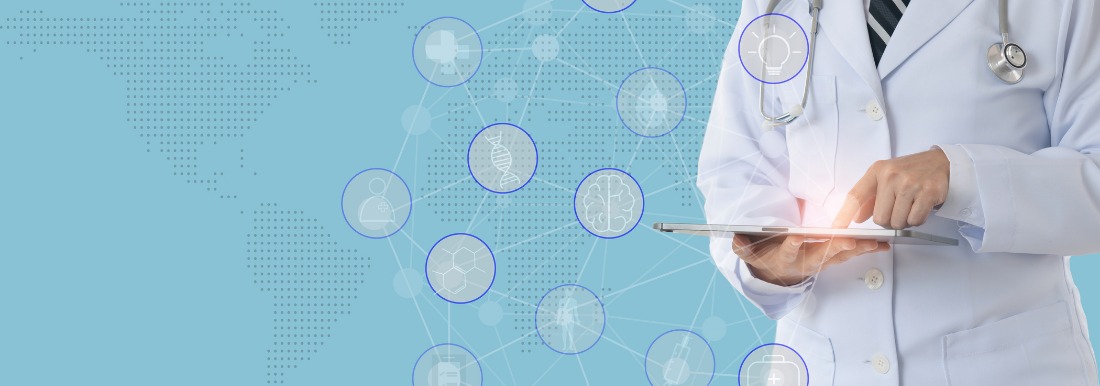
Importance of AI-Powered Predictive Analytics in Healthcare


The Healthcare industry has gone through a paradigm shift in the past few years. Healthcare is now more inclined towards the use of technology than ever. For example, healthcare organizations now have a dedicated IT infrastructure to perform daily operations/tasks. Several healthcare entities have a dedicated monitoring and cybersecurity system to boost service availability. All these things were not observed a few decades back in the healthcare industry. The use of technology in the healthcare industry has improved patient and staff satisfaction levels as well. In 2022, healthcare entities are now moving towards new-age technologies to further improve their services. One of the biggest emerging technologies used for healthcare services offerings is AI (Artificial Intelligence). With the help of AI-led predictive analytics models, healthcare organizations are going to the next level. Let us see the pros of AI-led predictive analytics models in the healthcare industry.
Before moving to the use cases of AI-led analytics, one should be familiar with predictive analytics. Predictive analytics is used to make predictions for the future or any unknown scenario/event. Predictive analytics models use historical data and real-time data to predict any unknown thing. The healthcare industry has to predict several things on a daily basis. For example, consider a patient suffering from the starting stage of breast cancer. Now, surgeons need to predict the exact time they have before the tumour cells start spreading to other parts of the body. Similar to this, there are many reasons why healthcare professionals need to predict things.
Predictive analytics is a redefined version of data analysis that involves data accumulation/mining and data modelling. Apart from AI, predictive analytics models also rely on ML (Machine Learning) to achieve the desired result. Several statistical techniques are used together for predictive analytics. When it comes to finding patterns and relationships within data sets, predictive analytics is the only solution. Powered by AI and ML, predictive analytics offers high accuracy and reliability. From decision-making to deciding the pre-operative procedure, predictive analytics models can help with many things. Let us now see the use cases of AI-led predictive analytics in the healthcare industry.
Early detection of any disease can benefit both the doctor and the patient. You must be familiar with the tumour cells that cause cancer in human bodies. When the tumour cells have completely developed themselves, there are fewer chances of the patient surviving. It is because the tumour cells outgrow themselves and spread to different parts of the body. However, if the development of tumour cells is detected in advance, patients can benefit. It is comparatively easier to fight cancer during the early stages. Predictive analytics models can detect an anomaly in the human body proactively. If early detection of an anomaly is done, resources, effort, money, and the life of a patient can be saved.
Sometimes, the condition of any patient seems fine without any viable symptoms. However, it can happen that a disease has started making its nest inside the body of the patient. Even smart clinical diagnostics may not identify the underlying problem in the human body. Sometimes, healthcare professionals do not know about the target location to be diagnosed. For such an instance, predictive analytics models can compare the patient data with past cases and predict any future risks. By doing so, doctors and patients will have a little extra time and can work proactively to eradicate the disease/abnormality.
Apart from the operative side, there is also an administrative side in the healthcare industry. Improper workflow management can lead to more workloads and poor management for any healthcare organization. Do you know that predictive analytics models are used to predict patient traffic? Healthcare organizations can now predict the peak times when they are expected to witness more patient visits. Based on the patient traffic, they can accumulate beds, wheelchairs, ventilators, and other equipment.
A healthcare organization does not have to panic at the last hour if they get the workflow right. Apart from patient traffic, clinical capacity can also be predicted with the help of AI/ML algorithms. All these steps allow a healthcare organization to minimize patient leakage and provide the best care to admitted patients. Patient leakage is a scenario when an admitted patient starts seeking medical attention from somewhere else. Patient leakage not only hampers the revenue but also maligns the reputation of a healthcare organization.
Healthcare organizations have to focus on supply chain management to offer the best care to patients. Consider the example of the recent COVID-19 pandemic, where many people lost their valuable lives. The biggest problem during the COVID-19 pandemic was the shortage of oxygen cylinders, ventilators, operating beds, and other medical equipment. It happened because healthcare entities couldn’t predict the patient traffic or the severity of the COVID-19 wave. If health entities could predict the patient data, then they could get the supplies beforehand. Predictive analytics models are trained to predict seasonal patients and can help with supply chain management.
Healthcare organizations often experience insurance and medical fraud. There is a need for better security and compliance in the healthcare industry to prevent loss of revenue. Predictive analytics models can detect fraud at a great speed. Usually, healthcare entities rely on an AIOps-based analytics platform to monitor the entire healthcare data. AIOps (Artificial Intelligence for IT Operations) can detect abnormal medical insurance or fraud. Intentional and unintentional errors in healthcare data can be identified easily by an AI-led monitoring system.
Medical equipment can degrade over time, and healthcare organizations have to look after them. Apart from physical equipment, many software systems are used by healthcare entities to treat patients, which can also become less productive over time. With predictive analytics models, a healthcare entity can predict performance degradation. Start using AI-led predictive analytics for better results in 2022!
Please complete the form details and a customer success representative will reach out to you shortly to schedule the demo. Thanks for your interest in ZIF!
Notifications